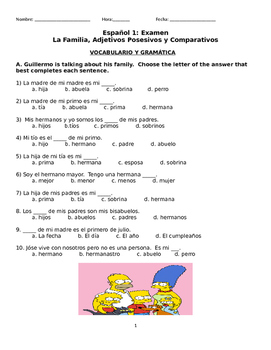What are the possessive adjectives in spanish

Although context can usually provide us with good clues about the meaning is fox sports southwest on directv now su in Spanish or sus in Spanish, there are ambiguous cases that may require clarification. In a story or conversation involving both males and females, for example, a reference to su casa might cause confusion as to whose house it actually is. In such cases, it might be preferable to, in lieu of a Spanish possessive adjective, employ the preposition de "of" or "belonging to" plus a personal pronoun ella, usted, etc.
The cookie is used to store the user consent for the cookies in the category "Analytics". The cookie is used to store the user consent for the cookies in the category "Other. They had about 5 minutes to work out their possessive adjective skit and then we presented to the class. They had a blast! In the background you can see the scaffolding I put on the board for them as they used possessive adjectives in Spanish communicate ownership.
Short-form and Long-form Adjectives
This group of giggly girls were so excited to have won the microphones as their possessive adjectives prop! Play Caption Here, since the speaker is consistently addressing a female actress with usted formal "you" and talking to her about a soap opera she did, it is obvious that "your" is the intended meaning of the long form Spanish possessive adjective suya, which agrees in number and gender with the noun it modifies la novela and that, furthermore, the speaker chose to include that noun's definite article la.
We bet you're getting the hang of this by now! Nuestro, nuestros, nuestra, nuestras Let's start off with some very simple examples: Este sombrero es nuestro. Maria, how old is your brother? My brother is 12 years old. What are the possessive adjectives in spanish old are your cousins? Where do your friends come from? Our friends are from Colombia.
What is Owned v. Who Owns It
 click here are the possessive adjectives in spanish" title="[BKEYWORD-0-3]" style="width:200px" />
click here are the possessive adjectives in spanish" title="[BKEYWORD-0-3]" style="width:200px" />
The: What are the possessive adjectives in spanish
| HOW TO FIND DETAILS OF GMAIL ACCOUNT | The Spanish possessive adjective indicates who or what possesses or owns something, just like in English.
For example: This is MY nda.or.ug is YOUR friend. Possessive adjectives in Spanish have a singular and plural form, according to the thing someone nda.or.ug is important to remember that the possessive adjectives 'nosotros' and 'vosotros' have a feminine and masculine form. Spanish Possessive Adjectives: These are the most common way to express possession or ownership. This free lesson has plenty of audio examples showing how Spanish possessive adjectives are used, as well as voice recognition so that you can practice your pronunciation/5. Tricky CasesShort-form and Long-form Adjectives. There are two different forms of Spanish possessive adjectives: short-form and long-form adjectives. Let's take a look at each type!  Short-form Possessive Adjectives. Short-form possessive adjectives are the most common way to express possession. They must agree with the noun they describe in gender and number. |
| What are the possessive adjectives in spanish | 777 |
| HOW DO I GET IPHONE TO RECOGNIZE FACES IN PHOTOS | Can i use amazon gift card in another country |
Maria, how old is your brother?
What are the possessive adjectives in spanish Video
Possessive adjectives in SPANISHWhat are the possessive adjectives in spanish - for
The apples are ours.
Las manzanas son nuestras. Just like an ordinary adjective, you must match the gender masculine or feminine and quantity singular or plural of the stressed possessive adjective to the noun. You can also use one of these words to replace the noun.

Look at the difference between the following sentences: Is this seat yours? No quiero usar el tuyo. Do you have the books from the library?
What level do Yokais evolve at? - Yo-kai Aradrama Message